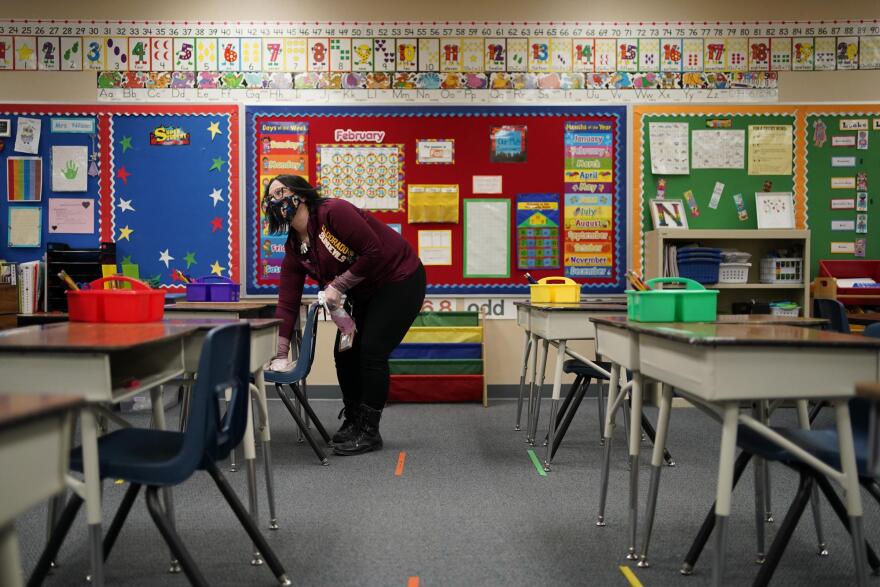Kids spent the past year at home doing distance learning during the pandemic.
Last month, Clark County School District opened the doors to the youngest elementary school kids. Now, with just 38 school days left this year, the district is ready to bring the rest of the kids back.
School isn’t going to look like it did in February 2020. A lot of these kids won’t be in their classrooms full-time, and when they arrive on campus, they’ll find a lot of changes in place to keep them safe during a pandemic that’s still ongoing.
However, those measures are now in conflict with what many parents want. Under the current state mandate, schools can only operate at 75 percent of capacity, which means some kids may not be in the classroom even if they want to be.
"We're thinking there is still going to be some parents who want to keep their kids at home," Superintendent Jesus Jara said, "The number may vary depending from school to school, but my goal as a superintendent and I'm committed to make sure as many kids that want to be face to face, we're going to give them that opportunity."
However, Rebecca Dirks Garcia, the president of the Nevada PTA and the administrator of a Facebook page dedicated to CCSD parents, said she is hearing from parents whose kids are on waiting lists for schools.
"Parents are being told already on April 6 that their elementary school doesn't have room for them to come back and they've been put on a waitlist," she said, "And as of this point, there isn't transparency from CCSD about how those waitlists are being managed."
Dirks Garcia is particularly concerned about special education students and students with individual education plans or IEPs. She said those students should be prioritized.
"CCSD has the ability to do that, and they have not - at this point," she said, "I think that is one of those aspects where CCSD can prioritize the needs of special education students and make sure that those who are going back into classrooms first are those with the highest need."
She said other school districts have put students with special needs at the top of the return list but the Clark County School District has not done that.
John Vellardita is the executive director of the Clark County Education Association. He said Dirks Garcia raises a good point about prioritizing students, but he said the pandemic is the underlying problem.
"The reality of it is, is COVID is determining how many people are back in these buildings because of the social distancing and the safety precautions that we need," he said, "As well as the physical size of these classrooms, at some point, we hit a brick wall. There is only so many students that can be in a classroom and not everybody is going to be accommodated until we get past COVID and we have the ability to bring everybody back."
Vellardita said he understands the frustration of students, parents and teachers who would love to come back full time.
Besides the capacity limits, Dirks Garcia is hearing from parents that the communication about their children's return to the classroom varies widely. Some schools have been excellent about communicating with parents about the return others have not.
She believes that is a problem the district's central office needs to address.
"It's a central office policy issue where we continue to see that there's non-standard communication coming from schools and that there seems to be no accountability for that," she said, "We know it's a problem. I've been on this show before, having this same conversation with Dr. Jara, and yet, months down the road, and we still see the same thing happening."
Jara said he knows this is a problem. He blames it on a culture at CCSD that has been around for decades.
"I've been trying to address it," he said, "I think it's better. It's not where I want it to be, but you can't change an old culture of 30 years plus, at least in the two-and-a-half years that I've been here."
Overall, Jara has a goal of returning to complete face-to-face learning this fall. He admits he can't guarantee that will happen because so much depends on the state of the pandemic, but that is what he wants to happen.
The school district and the teachers union are working on a summer school option for students. There is a bill before the Legislature to establish summer school for students in the most need, Vellardita said.
"The bill is targeted to specifically go after students that have the greatest need to have some instruction over the summer," he said, "It's very specific in terms of the population. It's designed to utilize some of these federal dollars to extend into the summer this school year for these kids who need it, who've lost instruction."
However, Vellardita said the teachers union and the district are going to extend the school year whether the bill is passed or not.
Dirks Garcia said most of the parents who responded to a recent survey her group conducted said they wouldn't send their kids to summer school, but for those who do want that option, she hopes the school district releases its plan quickly.
"I think the important thing when we talk about summer learning for kids... is that families need to know the logistics soon because parents are starting already to have to reserve day camp spots and put down deposits, and if the logistics of what CCSD offers doesn't work well for working families, then that's essentially a barrier," she said.
In addition, she said the curriculum needs to be engaging and fun, not drilling students toward passing a test.
Jesus Jara, Superintendent, Clark County School District; John Vellardita, Executive Director, Clark County Education Association; Rebecca Dirks Garcia, President, Nevada PTA








